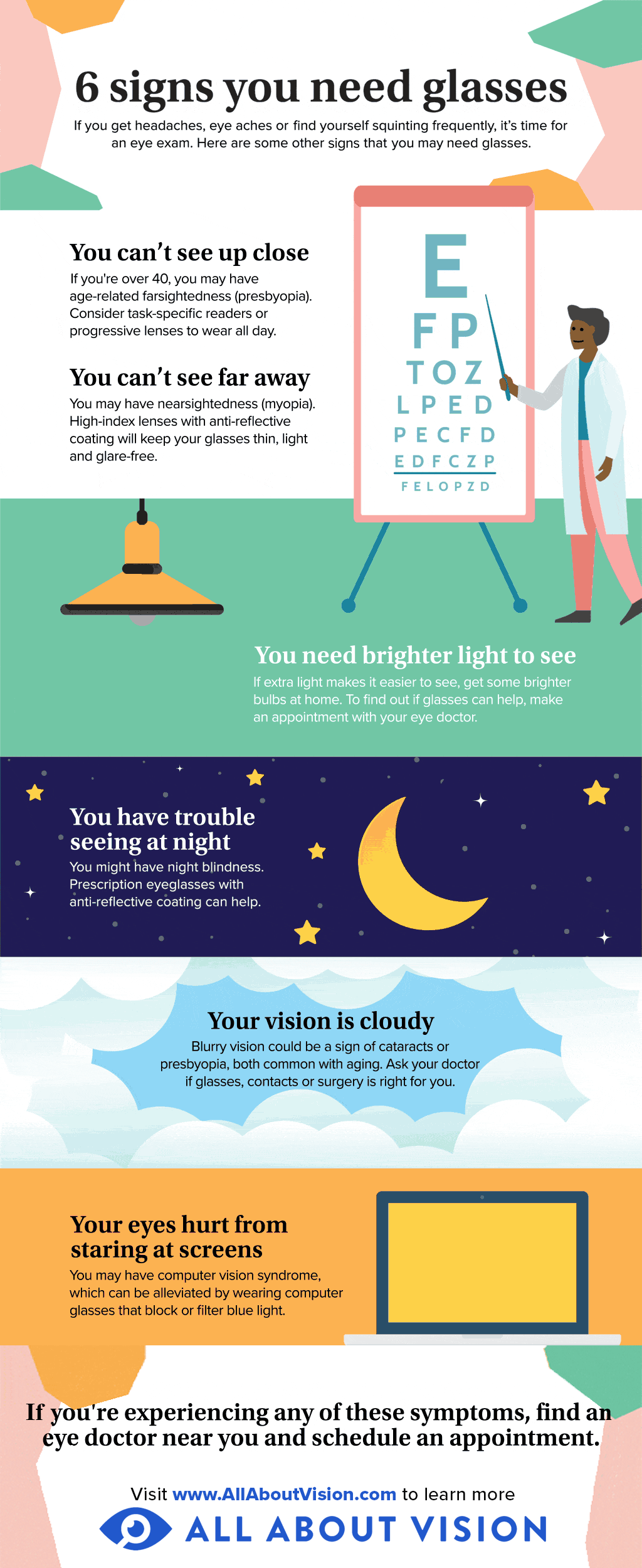6 signs you may need glasses

If you’re having difficulty reading up close or seeing stoplights at night, these are clear signs you may need glasses.
If your eyes ache from staring at screens all day, you may need glasses to relieve your digital eye strain.
Getting glasses is easy. Find an eye doctor near you, book an eye exam, get a vision prescription and purchase your glasses. You’ll see clearly and feel better.
But how do you know you should see an eye doctor? Look for these six signs that you may need glasses:
1. You can’t see up close
If you squint to read what’s on your phone or a restaurant menu (a common occurrence for people over 40), you may have presbyopia. Glasses, vision surgery and contact lenses can help.
While reading glasses are great for up-close tasks (like reading a menu), they aren’t best for all-day use. Progressive lenses, which are a bit more expensive, will help you to see near and far.
2. You struggle to see far away
If you’re having difficulty seeing objects at a distance, you may be nearsighted. Also called myopia, nearsightedness is the most common cause of impaired vision in people under age 40.
Good choices for eyeglass lenses for nearsightedness include high-index lenses (for thinner, lighter glasses) and lenses with anti-reflective coating.
3. You need brighter light to see
One thing that makes it easier for older eyes to focus is more light. If you need more light at home, a trip to the hardware store for brighter bulbs might be in order.
If you’re having trouble reading while you’re out and about, book an eye exam to find out why and what type of eyeglass lenses might be best for your needs.
4. You have trouble seeing at night
Night blindness (nyctalopia) is a vision problem that affects millions of Americans.
Treatment depends on the underlying vision problem. Symptoms of night blindness can accompany a handful of conditions, such as nearsightedness, cataracts and eye injuries.
More severe cases might require vision surgery, but prescription glasses with anti-reflective coating can go a long way toward making you feel safer driving at night.
5. Your vision is cloudy
Blurry vision can be caused by any number of eye problems, including presbyopia and cataracts, common conditions as your body ages.
If your blurry vision is a result of cataracts, vision surgery can solve your problem. But if it's not related to cataracts, prescription glasses or multifocal contact lenses likely can help.
6. Your eyes hurt from staring at screens
Staring at a screen for hours (at work or at home) can cause headaches, red eyes and eye fatigue.
The cure for computer vision syndrome (also known as digital eye strain) often is a pair of computer glasses.
Computer glasses help focus your intermediate vision, which is the distance between your face and your monitor. They're also designed to filter blue light, which will decrease the amount of glare from the screen.
If you’re experiencing any of sign you may need glasses, find an eye doctor near you. Chances are a pair of eyeglasses can help you to see near and far, read menus, drive safer at night and feel less eye strain when viewing digital devices.
Page published on Friday, January 10, 2020







